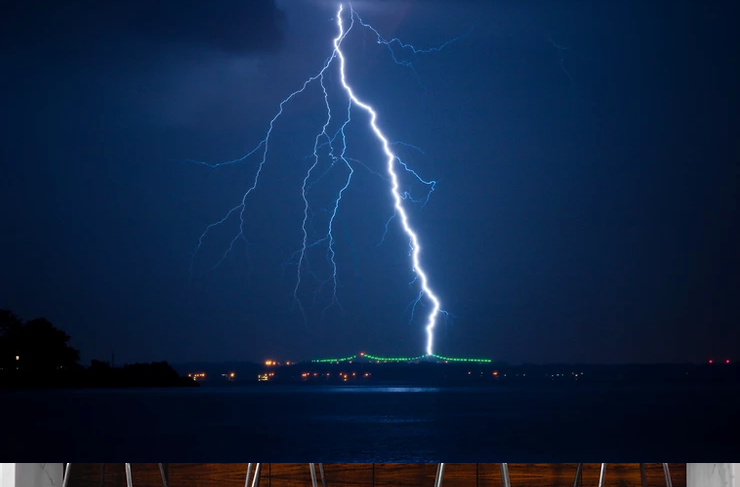The QLD summer storm season has officially arrived, and don’t we all know it!
Christmas Eve is due to expect heavy rain and power outages, across much of South East Queensland, as well as more rain to come for Christmas Day.
With our annual end of year storm season turning up show-stopping light and thunder shows, it’s important to again check our homes to ensure our loved ones and assets remain safe and protected.
At Auscan we’ve prepared a list of our TOP TIPS that will keep your home and its persons and belongings safe this QLD storm season.

‼️ Install a safety switch & test it to ensure it’s working
Not sure what safety switches are? They are the only thing protecting you, your family and anyone visiting your property from electric shocks. They turn off the power supply when there is a leakage in a property. This avoids serious electrical shock injuries occurring, as well as possible electrical burns – by stopping the current flow through a person.
Regardless if you own your own home or rent, home owners should consider having safety switches installed on all circuits.
The risk is real. One safety switch may not be enough.
How do you know if you have a safety switch or not?
Safety switches have a ‘T’ or ‘test’ button on the front face. If the devices in your switch board do not have a test function, they are probably circuit breakers not safety switches (WorksafeQLD).
Storm weather, such as heavy rain and lightning can also affect safety switches, especially if your property is struck by lightning, or even if the power lines or station nearby are hit by lightning. The electrical surge and voltage can cause safety switches to trip, and it’s important to note to wait until the storm ends before resetting them. Rain water can also get into power points, outdoor fittings and other electrical items during severe storms, so it’s best to way for these to completely dry out before resetting them.
‼️ Speak to a qualified electrician about surge protection – a small investment in this could save you thousands in replacing appliances
How much money is attached to your electrical system?
How would it be if you needed to replace every piece of electrical equipment in your entire home?
The average home gets hit with over 20 energy spikes per day. These spikes reduce the life of your appliances and electronics up to 30%.
If you owned one of the 30 million homes that got struck by lightning last year, you would understand how much you depend on your electrical devices throughout the day.
A lightning strike could damage not only your computer and your television, but also your refrigerator, dishwasher and microwave. Your HVAC system runs on electricity, so it is also at risk. It only takes one summer storm to wipe out your air conditioning or your garage door opener.
The worst part is that many homeowners insurance policies do not cover lightning strikes. Think about that next holiday, that new car or that home renovation that has to be put off because you’re replacing all your electrical equipment – that’s not a nice thought to have!
‼️ Know where to turn off your power, gas & water supply in an emergency
Electrical supply – remember to turn off power at the main switch in your switchboard. Electrical sparks may ignite a number of things following a severe storm. This is why, in an emergency, the electricity will likely need to be shut off immediately. If you need help identifying the circuit box, or just feel uncomfortable about the process, contact us for help and assistance!
Gas supply – turn off your gas supply or gas cylinders. Do not attempt to use gas appliances if your property has sustained damage. Natural gas leaks can be dangerous, so it’s important that every household member knows how to shut off natural gas in an emergency.
Water supply – locating this main shut-off valve in advance of a severe storm is important. If you have trouble, contact a local plumber or your area water utility for assistance. Once you’ve identified the main water shut-off valve, make sure everyone in the household knows where it is, and how to turn it off. To help prevent any possible confusion, consider labeling the water valve with a colored identification tab.
‼️ Pack up electrical equipment that’s not in use & store in a safe place
Pack up electrical equipment that’s not in use and store in a safe place, this can include unplugging outside TVs and non-fixed aerials and storing them in a dry area.
It’s also important to not use a fixed telephone during a thunderstorm – it may deliver an electric shock.
‼️ Go offline before the storm – when a storm approaches switch off & unplug electrical equipment, especially sensitive appliances such as computers & TVs
Before a storm hits, it’s best practices to yunplug all of your appliances. This is because lightning that strikes near a local electric pole can cause a surge of electricity to burst through the power lines. Your tech and appliances aren’t made to withstand the power surge that can be created from a lightning strike, so to avoid them essentially frying it’s best to unplug your high-ticket electronics, like your TV or gaming console. Unplugging your fridge can leave food items vulnerable to spoilage, so choose which appliances you unplug with caution.
You may also want to leave your stove plugged in if it is difficult to remove the plug from the outlet.
‼️ Listen to radio/news for weather updates
Expect a storm is coming? It’s best to check out what’s heading your way and how you can prepare.
Check out some of the useful industry links below to get more information on your particular area:
- South-East Queensland Thunderstorm Tracker: http://www.bom.gov.au/qld/forecasts/brisbane-thunderstorms.shtml
- Energex Emergency Outages: https://www.energex.com.au/home/power-outages/emergency-outages-streets/
- Energex Lighting Tracker: https://www.energex.com.au/home/power-outages/lightning-tracker

Received damage during a storm, or want to ensure your property is completely protected this QLD summer?
Talk to us about your concerns – we’ll be happy to chat with you and get you back up and running in no time! 👍


